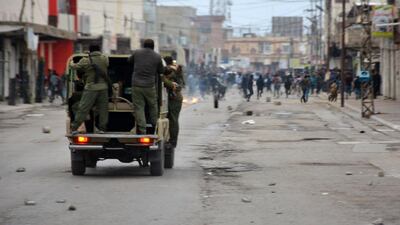Two political parties have withdrawn from the Kurdish regional government in Iraq amid street protests over delayed salaries, poor services and rampant corruption.
Three ministers from the Change Party and two from the Islamic Group Party left the 21-minister cabinet on Wednesday, Sarwa Abdul-Wahid, who leads the Change Party bloc in the Iraqi parliament in Baghdad, told The Associated Press. The Change Party-affiliated regional parliament speaker and the head of the board of investment are also set to resign, she added.
Tension has been high in the region since the central government in Baghdad imposed tough measures in response to an independence referendum called by the Kurdistan Regional Government (KRG) in which Kurds voted overwhelmingly to secede.
Mounting expectations coupled with an underwhelming post-referendum scenario fuelled a sense of exasperation among Kurds, and in recent days thousands have taken to the streets of Sulaimaniyah to protest. Five demonstrators are reported to have been killed and countless injured as Kurdish security forces made use of tear gas and fired live rounds to disperse stone-throwing crowds. Curfews have now been imposed in some cities.
____________
Read more:
Kurdish protesters set fire to KDP office in Sulaimaniyah
Iraq president calls for direct talks between Baghdad and Erbil
____________
Speaking to reporters on Thursday, prime minister Nechirvan Barzani blamed external forces for the violence that has broken out in some parts of the region.
On Wednesday, the United Nations Assistance Mission for Iraq (Unami) released a statement calling for restraint and calm on all sides, as well as urging security forces to exercise maximum restraint and demonstrators to avoid any act of violence. The UN agency also emphasised the critical role of free and impartial media and urged the authorities to protect them. This follows the forced suspension of local outlet NRT because of their coverage of the demonstrations.
And as Iraq's autonomous Kurdish region continuous to descend into seemingly untameable chaos, its security forces have come under fire for their alleged mistreatment and disappearing of detainees.
Over 350 prisoners held by the KRG have been forcefully disappeared, said Human Rights Watch (HRW) on Thursday. Most prisoners are suspected ISIL-affiliated Sunni Arabs, displaced to Kirkuk or residents of the city.
The New York-based rights group suspects that the number of detainees disappeared is far higher.
The men are said to have vanished from detention centres following the Iraqi federal forces' retaking of Kirkuk from Kurdish Peshmerga forces on October 16. First hand accounts of the arrests recount late night raids carried out by armed men in black Asayish — Kurdish security — uniforms followed by complete lack of information on the whereabouts of their loved ones.
Although it is unclear where the men have been relocated to, sources point to the Kurdish-run Al Salam military base in Sulaimaniyah where Kurds are known to be running a number of informal detention facilities, sparking concern among human rights organisations and family members alike.
Recently released detainees of Al Salam are said to have reached out to the relatives of four disappeared prisoners to inform them that they had been in the same cells as their family members. The bulk of the disappeared are thought to be there, while a smaller number could be in the capital Erbil, HRW senior researcher Belkis Wille told The National.
"The Kurds are holding so many Sunni Arabs they captured from camps and elsewhere. With the breakdown in relations between Baghdad and Erbil, loved ones will have a harder time visiting them or at the very least getting information about their well-being," said Ms Wille.
But these findings are not new to human rights organisations working in Iraq and Kurdistan, with past reports accusing the regional government of similar human rights breaches.
In 2007 HRW released a report entitled "Torture and Denial of Due Process by the Kurdistan Security Forces", in which the group highlighted prisoners' lack of access to lawyers and torture by Asayish members among other alarming findings. Ten years on, little has changed and in the aftermath of ISIL, Sunni Arabs have seemingly become the prime target.
"While I can't say anything categorically, I have been working on disappearances cases in the KRI (Kurdistan Region Iraq) and disputed territories for a while now and I have only come across two cases of Kurds who were disappeared; both times Kurds that grew up in Arab communities and did not speak Kurdish," said Ms Wille. "And the hundreds of other cases I have worked on have been mostly Arabs and some Turkmen,"
The hundreds of disappearances prompted a statement by Iraqi prime minister Haider Al Abadi who called for an investigation into the disappearances.
The former head of the security committee of Kirkuk's provincial council, Azad Jibari, has denied that Kurdish forces played a role in kidnappings and forced disappearances.
"Generally across [areas controlled by] the Kurdistan Regional Government, authorities have been cracking down on critical free speech. Unfortunately with the current tensions as high as they are and fighting continuing between KRG forces and Baghdad we'll likely see a continued crackdown in the new year which will impact most acutely the media and civil society," said Ms Wille.
In its 2017 World Press Freedom Index, Reporters Without Borders ranked Iraq 158 out of 180 countries.

